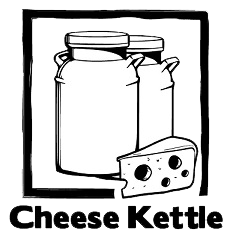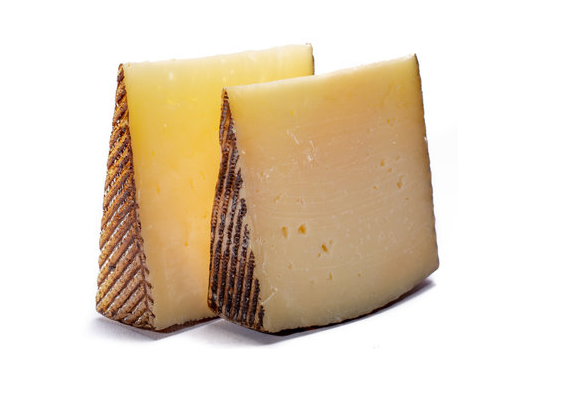Manchego is a firm cheese with a compact consistency and buttery texture, originating from the La Manchega region in Spain. It often contains small and unevenly distributed air pockets. This cheese is traditionally made from sheep’s milk, but you can also make it with cow’s or goat’s milk. If you opt to use cow’s milk, however, consider adding lipase. This will give you a stronger flavor for Manchego.
This cheese remains rich and flavorful whether aged for a week or a month, and it melts quite well, making it a wonderful cheese to top on casseroles, pasta and even pizza. Here’s how you can make your own Manchego cheese.
Aging Time: 2 months or more
Yield: 2.2 kg (5 lbs) of Manchego cheese
Ingredients
1) 15 L (4 gallons) of milk (cow, goat or sheep). Do not use ultra pasteurized milk.
2) 3/8 teaspoon Danisco MA 4001/ 4002 Mesophilic Culture
3) ½ teaspoon single strength rennet
4) Calcium Chloride (if you are using pasteurized milk)
5) 1/2 teaspoon lipase powder dissolved in ¼ cup cool water (set for 20 minutes)- Use only if you are using cow’s milk
Equipment
1. large stainless steel pot
2. thermometer
3. curd knife and curd cutter
4. slotted ladle or spoon
5. Manchego cheese hoop
6. cheese cloth or butter muslin
7. colander
8. cheese salt
Instructions
1. Sanitize all your equipment before you make cheese.
2. Heat the milk to 320 C (860 F).
3. Sprinkle the mesophilic culture. Let it rehydrate for two minutes. Stir well in an up and down motion.
4. Add the Calcium Chloride. Stir gently for a minute to mix it well with the milk.
5. Cover the milk and allow to it ferment for 60 minutes.
6. If you are using cow’s milk, add the lipase and stir well.
7. Add the rennet. Stir again still in a up and down stroke for 1 minute.
8. Allow the milk to set for 45 minutes or until you notice the whey separating from the curds. This process may take a bit longer to happen if you added lipase.
9. Check for a clean break. You’ll know you have a clean break when you poke the curd with a knife at a 30-degree angle, you can lift it up a bit without the whey.
10. Cut the curds into ½-inch cubes. Allow it to set for 5 minutes to heal.
11. Using a whisk, stir the curds and slice it smaller pieces for 30 minutes. Make sure that the curds are roughly the same size after this process.
12. Slowly increase the heat to 37.70 C (1000 F) over the next 30 minutes, adding around 10 C every 6 minutes. Continue to stir. The curds will shrink as you stir.
13. Once the target temperature is reached, turn off the heat.
14. Allow the curds to set for another 5 minutes.
15. Line the colander with cheesecloth. Pour the curds into the colander to drain.
16. Line a cheese hoop with cheese cloth. Transfer in the curds.
17. Press the curds at 7 kg (15 lbs) of pressure for 15 minutes.
18. Unwrap the cheese, flip and re-wrap. Press again at 7 kg (15 lbs) of pressure for another 15 minutes. Do this process two more times.
19. Press again at 14 kg (around 30 lbs) of pressure for 8 hours.
20. Make the brine. Mix 900 g (2 lbs) of salt with 3.7 L (1 gallon) of cold water. Mix well.
21. Soak the cheese in the brine for 6 hours, flipping it every 2 hours.
22. Remove the cheese from the brine. Air dry your Manchego cheese at room temperature (20 to 220 C or 68 to 720 F) for two to three days.
23. Age at 120 to 150 C (550 to 600 F) for as long as you like.
24. Coat the Manchego with olive oil daily. If mold appears, wipe it off with a clean cloth dipped in salt water or vinegar.
Are You Planning to Start Your Own Cheese Making Business?
Cheese Kettle’s mission is to help cheese makers start and grow their business. We provide consultation services for cheese makers wanting to level up their hobby and turn it into something income generating.

Not sure where to start? Our Comprehensive Starter Report can help set you up. It will help you understand how to start your own cheese making business, the equipment you need for your cheese making, provide you with a production layout and many others. This report is specifically created for your business after an intensive consultation with the experts on our team.
We also provide cheese making equipment, from milk tanks to pasteurizers. Visit our shop today to see the full range of our product offering.

